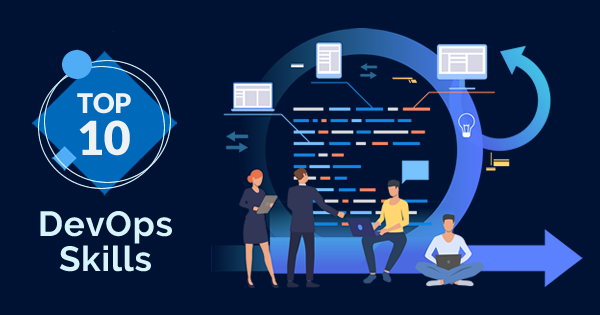DevOps is no magic, but it can definitely look like it from the outside. In today’s corporate world, workers in the innovative fields are generating new roles for themselves. The role of the DevOps Engineer is one instance of such. There’s a lot of misconception regarding who is a DevOps Engineer? Are they the person who writes the code or are they responsible for the work of a system engineer? Well! Not exactly. Through this post, I shall guide you through the roles and responsibilities of a DevOps Engineer.
What is DevOps?

DevOps is the blend of cultural philosophies, tools, and practices that increases an organization’s ability to deliver services and applications at high speed: evolving and upgrading products at a faster rate than organizations using traditional software development and infrastructure management procedures.
This speed facilitates organizations to serve their customers better and compete more efficiently in the market. DevOps culture is introduced to create better collaboration, improved communication, and agile relations between the Operations team and the Software Development Team. Under a DevOps model, the gap between the development and operations teams is bridged. Sometimes, the two teams are merged into one team where the engineers work through the entire application lifecycle, from development to test and deployment to operations, and develop a set of skills not limited to a single function.
The teams make use of practices to automate procedures that traditionally have been slow and manual. These tools also support engineers to independently achieve tasks that normally would’ve required help from other teams, and this further enhances a team’s velocity. Simply put, DevOps is a set of practices that combine Software Development (Dev) and IT operations (Ops) which intend to shorten the systems development life cycle and provide continuous delivery with high software quality
Unlike popular opinion, DevOps is not:
- a combination of the Development and Operations team.
- a tool or a product.
- a separate team.
- automation.
However, DevOps is a process that includes continuous:
- Integration
- Development
- Testing
- Deployment
- Monitoring.
Understanding the role of a DevOps Engineer.
The DevOps Engineer is truly a revival of the cloud infrastructure IT services. It is often strenuous to understand this role because the DevOps Engineer is the product of the dynamic workforce that has not yet finished evolving.
DevOps professionals come from a multitude of IT backgrounds and begin the role in different places in their careers. Generally, the role of a DevOps engineer is not as easy as it appears. It requires looking into seamless integration among the teams, successfully and continuously deploying the code. The DevOps approach to software development requires recurring, incremental changes, and DevOps Engineers seldom code from scratch. However, they must understand the fundamentals of software development languages and be thorough with the development tools utilized to make a new code or update the existing one.
A DevOps Engineer will work along with the development team to tackle the coding and scripting needed to connect the elements of the code, such as software development kits (SDKs) or libraries and integrate other components such as messaging tools or SQL data management that is needed to run the software release with operating systems and production infrastructure.
A DevOps Engineer should be able to manage the IT infrastructure in accordance with the supported software code dedicated to multi-tenant or hybrid cloud environments. There’s a need to have a facility for required resources and for procuring the appropriate deployment model, validating the release and monitoring performance. DevOps Engineers could either be the system administrators who have moved into the coding domain or the developers who have moved into operations. Either way, it is a cross-function role that is seeing a huge upward trajectory in the way software is developed and deployed in object-critical applications.
It isn’t rare for DevOps to be called to mentor software developers and architecture teams within an organization to educate them about how to create software that is easily scalable. They also work with the security teams and IT to ensure quality releases. Some DevOps teams include DevSecOps, which bids DevOps principles to driven security measures.
The DevOps Engineer is a significant IT team member as they work with an internal customer. This includes software and application developers, QC personnel, project managers and stakeholders usually from the same organization.
They rarely work with end-users, but keep a “customer first” mindset to comply with the needs of their internal clients. A DevOps Engineer is a customer-service oriented, team player who can arise from a number of different work and educational backgrounds, but through their vivid experience has developed the right skill set to move into DevOps.
Tasks of a DevOps Engineer.

Typically, the role of a DevOps Engineer comprises of the following duties:
- Work with a variety of open-source tools and technologies for managing source codes.
- Deploying multiple automation tools of DevOps to perfection.
- Continuous iteration of software development and testing.
- Connect to business and technical goals with alacrity.
- Analyze code and communicate descriptive reviews to development teams to ensure a marked improvement in applications and on-time completion of projects.
- Design, develop, and implement software integrations based on the user’s review.
- Apply cloud (AWS, GCP, Azure) computing skills to deploy upgrades and fixes.
- Troubleshoot production problems and coordinate with the development team to streamline code deployment.
- Conduct systems tests for performance, availability, and security.
- Collaborate with team members to improve the company’s engineering tools, data security, systems, and procedures.
- Optimize the company’s computing architecture.
- Troubleshooting documentation.
- Implement automation tools and frameworks (CI/CD pipelines).
- Develop and maintain design
- Understand the needs and difficulties of a client across development and operations
- Formulate solutions that support business, technical strategies and organization’s goals.
- Develop solutions encompassing technology, process, and people for continuous delivery, build and release management, infrastructure strategy & operations, a basic understanding of networking and security
- Implement and recommend solutions.
- Expertise and knowledge in current and emerging processes, techniques and tools
- Build the DevOps practice within ThoughtWorks and drive our thought-leadership externally
- Timely identification and resolution of problems.
- Design, develop and maintain the CI/CD tools and infrastructure to deliver Horizon Cloud Service
Skills required for a DevOps Engineer

- A Bachelor’s degree in Engineering, Computer Science or relevant field.
- 3+ years’ experience in the software engineering role.
- Expertise in code deployment tools (Puppet, Chef, and Ansible).
- Expertise in software development methodologies.
- Experience of server, network, and application-status monitoring.
- Ability to maintain Java web applications
- Strong command on software-automation production systems (Selenium and Jenkins).
- Knowledge of Python or Ruby and known DevOps tools like Git and GitHub.
- Working knowledge of various databases like SQL (Structured Query Language).
- Problem-solving attitude.
It is essential to understand that a DevOps engineer is built out of the growing needs of the business to get a tighter hold of the cloud infrastructure in a hybrid environment. Organizations implementing DevOps skills yield better advantages such as spend relatively less time on configuration management and faster deployment of applications. Demand for people with DevOps skills is growing exponentially because businesses get great outputs from DevOps. Organizations utilizing DevOps practices are overwhelmingly high-functioning: They deploy code up to 30 times more often than their competitors, and 50 percent fewer of their deployments fail, according to 2013-2017 State of DevOps.







